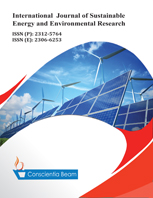The Impact of Energy Consumption and Productivity Growth on Carbon Emissions in Ghana
Abstract
The environment plays two vital roles for mankind. It provides food and raw materials for production and consumption and also accepts the wastes generated through man’s activities and renders them harmless. This calls for sustainable environmental management. This study examines the impact of productivity growth, forest depletion, renewable energy consumption and non-renewable energy consumption on carbon emissions in Ghana. The findings suggest that productivity growth is the most important factor that reduces carbon emissions in the short-run. In the long run however, renewable energy consumption has most influence on carbon emissions. Forest depletion leads to carbon emissions in both the short and long –run. The study recommends that in order to curb carbon emissions, afforestation programmes and investment in renewable energy should be encouraged.

